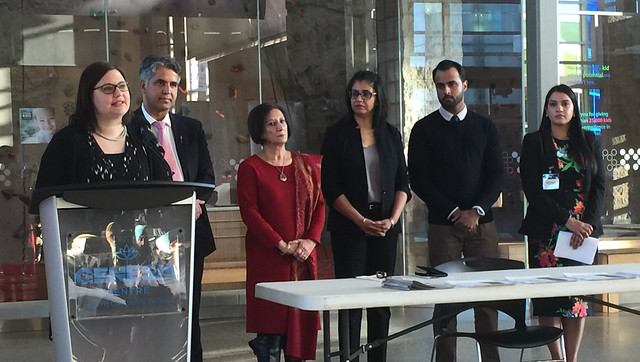This release was issued under a previous government.

Associate Minister of Health Brandy Payne announces a grant that will provide better access to opioid dependency treatment to Calgary's South Asian community.
Based on a recommendation by the Minister’s Opioid Emergency Response Commission, the government is providing a $560,000 grant to Punjabi Community Health Services to provide culturally respectful harm-reduction services for people who use substances, as well as support for their families.
“Information on opioid use and treatment needs to be accessible to all Albertans at risk of opioid overdose, while supporting and respecting as many cultures and languages as possible. We're pleased Punjabi Community Health Services will be a bridge between South Asian citizens and Alberta’s health system, supporting access to harm-reduction and treatment services.”
"Drugs and substance abuse lead to self-destructive and isolating lifestyles which hurt individuals, families and communities alike. Starting a conversation about substance use in the family or community can be difficult for many reasons, but it’s a vital first step in getting a loved one out of harm’s way. This funding underscores the need for these difficult conversations, and will save lives by ensuring that help is available to those in need.”
Punjabi Community Health Services, which operates out of the Genesis Centre in northeast Calgary, has seen an increase in people seeking help for problematic substance use. With the grant, it will hire two new case managers who can speak several South Asian languages such as Punjabi, Urdu and Hindi. They will provide counselling and work as patient navigators, linking individuals and their families with lifesaving harm-reduction services, physicians and other opioid-related services and treatment options. Work will include:
- A support group for people with opioid dependency.
- Development of a peer mentorship program where people with lived experience mentor individuals and families affected by substance use.
- Creation of hubs to support youth affected by substance use.
“The Government of Alberta has made a groundbreaking investment that will save lives. Together, we will impact the opioid crisis through our robust, culturally relevant harm-reduction programs.”
Punjabi Community Health Services will also distribute take-home naloxone kits and offer community awareness workshops to help people from the South Asian community better understand and support friends and family members affected by opioid use.
“Over the past years, Punjabi Community Health Services has seen an increase of those suffering from a substance-use disorder. The opioid program will significantly impact the lives of our clients by addressing the complex issues related to opioid addiction. We look forward to creating trusted relationships with our clients and providing access to services for those who have been suffering far too long.”
The 2016 census reported that close to 27,000 people in Calgary speak Punjabi at home and more than 10,600 speak Urdu at home. As part of its continued work to increase access to opioid treatment and services across Alberta, the government has translated opioid-related information into 10 languages, including Punjabi and Urdu. The printable documents include details on how to recognize and respond to an opioid overdose, where to get free naloxone kits and where to access Suboxone or methadone treatment through opioid dependency clinics.
There have been more fentanyl-related deaths in Calgary than in any other major cities in the province. As of Sept. 30, 2017, 170 people in the city have died from an apparent fentanyl-related overdose. This fall, the government expanded access to opioid treatment in Calgary by adding new spaces to help treat more than 1,100 new patients annually.